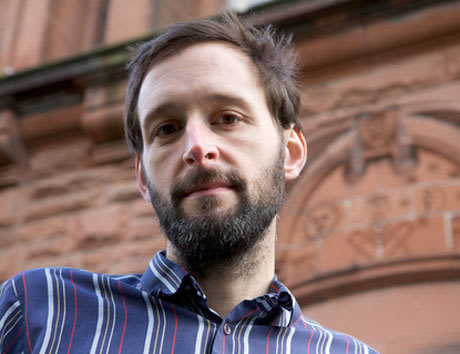"This song," intones Alisdair Roberts, gravely, "is about the Highland Clearances. In the 19th century, many people were driven off their land by aristocratic landowners, who decided the land would be put to better use for grazing sheep." A true story, of course. Tellingly though, the Scot does not mention that said victims were not only driven from their land, but burned from their homes and left to starve. In fact, his dark passion seems to materialise only in song. It feels less than revelatory but somehow surprising: Alisdair Roberts is, for the most part, a startlingly amiable presence.
Looking as strangely arcane as his music sounds, Roberts cuts a wise, slender figure in faded jeans, scruffy shoes and a polo shirt. The combo partly grounds him in normality and partly conjures up a release-day inmate who's been manhandled into garments last worn 23 years ago. His audience are intrigued yet docile. As the show begins, it seems likely the number of attendees who do not possess a mortgage could be counted on one hand. You see the appeal to older generations: there is an antidotal, native authenticity to the music, riffs that fiddle and caper deliciously between richly poetic lyrics, earnest verses of bookish folk that don't care for restraint or irony.
Accordingly, the songs feel both archaic and original. Roberts is flanked by two of his Friends, whose contrasting instruments, a white electric guitar and ornate double bass, seem deliberately symbolic. Singing phrases like "To their merry wake bonny lassy," Roberts is as ruddy and intense as a man using words like "merry wake bonny lassy" ought to look, his sculpted features romantically impassioned.
Meandering from merry wakes to "abbots of unreason," Roberts never loses sight of the audience. The emotional zenith is "Farewell Sorrow," a philosophical, frisson-inducing exhortation that we embrace both life and death entirely. Elsewhere an a cappella encore brings the man to audience level, hunched and bony and in our faces, singing complex verses of staggering humanity, closed-eyed and swaying like a ship-captain drunkenly interrogating his crew. The venue's frivolous neon "BANG BANG" stage light has never seemed less pertinent.
Looking as strangely arcane as his music sounds, Roberts cuts a wise, slender figure in faded jeans, scruffy shoes and a polo shirt. The combo partly grounds him in normality and partly conjures up a release-day inmate who's been manhandled into garments last worn 23 years ago. His audience are intrigued yet docile. As the show begins, it seems likely the number of attendees who do not possess a mortgage could be counted on one hand. You see the appeal to older generations: there is an antidotal, native authenticity to the music, riffs that fiddle and caper deliciously between richly poetic lyrics, earnest verses of bookish folk that don't care for restraint or irony.
Accordingly, the songs feel both archaic and original. Roberts is flanked by two of his Friends, whose contrasting instruments, a white electric guitar and ornate double bass, seem deliberately symbolic. Singing phrases like "To their merry wake bonny lassy," Roberts is as ruddy and intense as a man using words like "merry wake bonny lassy" ought to look, his sculpted features romantically impassioned.
Meandering from merry wakes to "abbots of unreason," Roberts never loses sight of the audience. The emotional zenith is "Farewell Sorrow," a philosophical, frisson-inducing exhortation that we embrace both life and death entirely. Elsewhere an a cappella encore brings the man to audience level, hunched and bony and in our faces, singing complex verses of staggering humanity, closed-eyed and swaying like a ship-captain drunkenly interrogating his crew. The venue's frivolous neon "BANG BANG" stage light has never seemed less pertinent.
